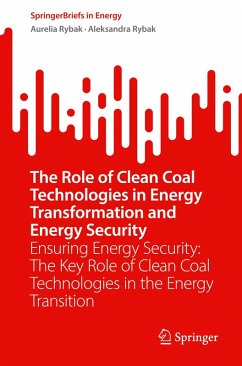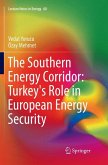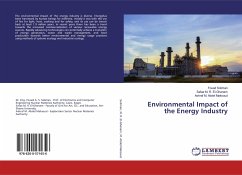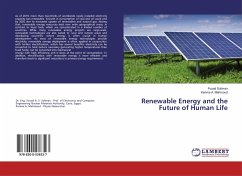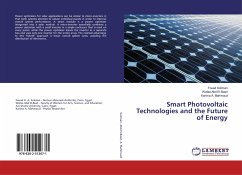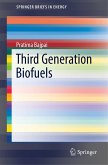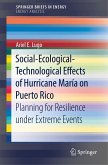Aurelia Rybak, Aleksandra Rybak
The Role of Clean Coal Technologies in Energy Transformation and Energy Security
Ensuring Energy Security: The Key Role of Clean Coal Technologies in the Energy Transition
Aurelia Rybak, Aleksandra Rybak
The Role of Clean Coal Technologies in Energy Transformation and Energy Security
Ensuring Energy Security: The Key Role of Clean Coal Technologies in the Energy Transition
- Broschiertes Buch
- Merkliste
- Auf die Merkliste
- Bewerten Bewerten
- Teilen
- Produkt teilen
- Produkterinnerung
- Produkterinnerung
This book presents the latest achievements in the field of clean coal technologies and shows how these innovations contribute to environmental protection and ensure stability of energy supplies. The book describes how clean coal technologies can revolutionize our energy future. From advanced mining methods to modern energy storage solutions, this book is a source of knowledge about sustainable development and technological innovation.
Andere Kunden interessierten sich auch für
![The Southern Energy Corridor: Turkey's Role in European Energy Security The Southern Energy Corridor: Turkey's Role in European Energy Security]() Vedat YorucuThe Southern Energy Corridor: Turkey's Role in European Energy Security77,99 €
Vedat YorucuThe Southern Energy Corridor: Turkey's Role in European Energy Security77,99 €![Environmental Impact of the Energy Industry Environmental Impact of the Energy Industry]() Fouad SolimanEnvironmental Impact of the Energy Industry37,99 €
Fouad SolimanEnvironmental Impact of the Energy Industry37,99 €![Renewable Energy and the Future of Human Life Renewable Energy and the Future of Human Life]() Fouad SolimanRenewable Energy and the Future of Human Life37,99 €
Fouad SolimanRenewable Energy and the Future of Human Life37,99 €![Smart Photovoltaic Technologies and the Future of Energy Smart Photovoltaic Technologies and the Future of Energy]() Fouad SolimanSmart Photovoltaic Technologies and the Future of Energy42,99 €
Fouad SolimanSmart Photovoltaic Technologies and the Future of Energy42,99 €![Clean Coal Technologies Clean Coal Technologies]() Clean Coal Technologies154,99 €
Clean Coal Technologies154,99 €![Third Generation Biofuels Third Generation Biofuels]() Pratima BajpaiThird Generation Biofuels39,99 €
Pratima BajpaiThird Generation Biofuels39,99 €![Social-Ecological-Technological Effects of Hurricane María on Puerto Rico Social-Ecological-Technological Effects of Hurricane María on Puerto Rico]() Ariel E. LugoSocial-Ecological-Technological Effects of Hurricane María on Puerto Rico43,99 €
Ariel E. LugoSocial-Ecological-Technological Effects of Hurricane María on Puerto Rico43,99 €-
-
-
This book presents the latest achievements in the field of clean coal technologies and shows how these innovations contribute to environmental protection and ensure stability of energy supplies. The book describes how clean coal technologies can revolutionize our energy future. From advanced mining methods to modern energy storage solutions, this book is a source of knowledge about sustainable development and technological innovation.
Produktdetails
- Produktdetails
- SpringerBriefs in Energy
- Verlag: Springer / Springer Nature Switzerland / Springer, Berlin
- Artikelnr. des Verlages: 978-3-031-80651-3
- Seitenzahl: 84
- Erscheinungstermin: 3. Januar 2025
- Englisch
- Abmessung: 235mm x 155mm x 5mm
- Gewicht: 158g
- ISBN-13: 9783031806513
- ISBN-10: 3031806514
- Artikelnr.: 72078226
- Herstellerkennzeichnung Die Herstellerinformationen sind derzeit nicht verfügbar.
- SpringerBriefs in Energy
- Verlag: Springer / Springer Nature Switzerland / Springer, Berlin
- Artikelnr. des Verlages: 978-3-031-80651-3
- Seitenzahl: 84
- Erscheinungstermin: 3. Januar 2025
- Englisch
- Abmessung: 235mm x 155mm x 5mm
- Gewicht: 158g
- ISBN-13: 9783031806513
- ISBN-10: 3031806514
- Artikelnr.: 72078226
- Herstellerkennzeichnung Die Herstellerinformationen sind derzeit nicht verfügbar.
Aurelia Rybak is an associate professor in the Department of Electrical Engineering and Industrial Automation of the Faculty of Mining, Safety Engineering, and Industrial Automation at the Silesian University of Technology. For over 15 years, she has been conducting research on the development of clean coal technologies, energy security, and energy transition. She has managed and coordinated projects aimed at the development of clean coal technologies. She is the author and co-author of numerous scientific publications, as well as a patent related to this topic. She has participated in many international scientific conferences, including COP24, where she presented the results of her research on CCT technologies and sustainable energy transformation. She is also a member of the advisory team of the European Commission, among others, in the field of technologies supporting coal regions in transition. Aleksandra Rybak is an associate professor in the Department of Physical Chemistry and Technology of Polymers of the Faculty of Chemistry at the Silesian University of Technology. For over 20 years, she has been conducting research on the development of membrane techniques based on modern hybrid membranes used in the development of clean coal technologies (CCTs), which are an important element related to energy security and energy transition. She managed and coordinated several projects aimed at developing membrane techniques used in clean coal technologies. She is the author and co-author of numerous scientific publications, awards, as well as a patent related to this subject. She participated in many international scientific conferences, among others, COP24, where she presented the results of her research on membrane technologies at CCTs. She is also a reviewer and expert of the European Commission (Clean Hydrogen, HaDEA, EISMEA, REA, EASME, Marie Sklodowska-Curie Actions COFUND, etc.), the National Centre for Research and Development, the Portuguese Foundation for Science and Technology (FCT), the European Science Foundation (ESF) Expert Database, the Czech Science Foundation and the Slovak Research and Development Agency. She also works as the editorial board member of many journals and was editor of few special issues of Electronics, Membranes and Metals.
Part I. Introduction.- Chapter 1. Definition of clean coal technologies.- Chapter 2. The role of clean technologies in the energy transformation.- Chapter 3. Challenges and benefits of using clean coal technologies.- Part II. Coal market.- Chapter 4. World coal resources.- Chapter 5. Alternative energy sources.- Part III. Clean coal technologies CCT.- Chapter 6. CCS, membrane techniques.- Chapter 7. Waste management from the coal production and combustion process.- Part IV. Coal energy technologies and renewable energy sources.- Chapter 8. Hybrid energy solutions.- Chapter 9. The role of waste (fly ash) in the development of renewable energy sources.- Part V. Clean coal technologies and energy security.- Chapter 10. New directions of research in the field of clean coal technologies.- Chapter 11. Challenges and opportunities for clean coal technologies.- Chapter 12. The future of clean coal technologies.- Chapter 13. Summary and Conclusions.
Part I. Introduction.- Chapter 1. Definition of clean coal technologies.- Chapter 2. The role of clean technologies in the energy transformation.- Chapter 3. Challenges and benefits of using clean coal technologies.- Part II. Coal market.- Chapter 4. World coal resources.- Chapter 5. Alternative energy sources.- Part III. Clean coal technologies CCT.- Chapter 6. CCS, membrane techniques.- Chapter 7. Waste management from the coal production and combustion process.- Part IV. Coal energy technologies and renewable energy sources.- Chapter 8. Hybrid energy solutions.- Chapter 9. The role of waste (fly ash) in the development of renewable energy sources.- Part V. Clean coal technologies and energy security.- Chapter 10. New directions of research in the field of clean coal technologies.- Chapter 11. Challenges and opportunities for clean coal technologies.- Chapter 12. The future of clean coal technologies.- Chapter 13. Summary and Conclusions.

